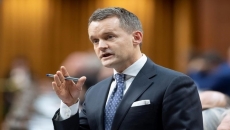OTTAWA - Canada's premiers will formally accept an offer from the federal government for billions in additional health-care funding, but say they will also insist the money continue to flow for more than 10 years.
The deal amounts to an additional $46 billion from Ottawa over a decade, as long as the provinces meet some conditions on how the money is spent and report data to demonstrate whether and how the money is making a difference in the health-care system.
The premiers say the offer, tabled at a first ministers' meeting last week, is nowhere near what they asked for — but new money cannot be turned down.
"We have agreed to accept the federal funding," Manitoba Premier Heather Stefanson said in an interview with The Canadian Press following a virtual meeting of all premiers Monday afternoon.
"We believe it's a step in the right direction, but we also recognize that it doesn't deal with that long-term sustainability of health-care funding challenges that we all face in our provinces and territories. So we will be writing to the prime minister to talk about and to address some of those issues."
Stefanson is currently the chair and spokeswoman for the group of premiers known as the Council of the Federation.
Since 2020 the premiers have been asking Ottawa to increase the annual health transfers to cover 35 per cent of provincial health budgets, up from the current 22 per cent. To get there, the premiers said they wanted an immediate increase of $28 billion a year, and then an additional five per cent annually after that.
The offer Prime Minister Justin Trudeau made last week includes a top-up to the Canada Health Transfer of $2 billion immediately, annual increases to of at least five per cent for the next five years, and $25 billion over 10 years for priority areas: mental health, data collection, family medicine, surgical backlogs and health human resources.
The provinces and territories will only get the additional money if they agree to conditions, including an upgrade of health data collection to better show how the system is performing and annual reporting of specific indicators.
Ottawa intends to sign one-on-one agreements with every province and territory to tailor the deal to their unique needs. Health Minister Jean-Yves Duclos and Intergovernmental Affairs Minister Dominic LeBlanc have already met with Ontario, Nova Scotia and Newfoundland and Labrador to start working toward those agreements.
LeBlanc said they will be in British Columbia Tuesday, followed by the territories and then the prairies before the end of the week.
The federal Liberals want the broad strokes of the agreements in place before the next budget, which is expected sometime in March or early April.
“What we’re looking for is a quick agreement on the path forward," Duclos said following a meeting with Nova Scotia Premier Tim Houston in Halifax.
The initial agreements will be a general acceptance of the offer and conditions, while it will take longer to develop specific plans for each province, he said.
The premiers are concerned that while the annual Canada Health Transfer will continue to rise, the one-on-one agreements for targeted programs are only funded for 10 years.
Stefanson called that a "fiscal cliff."
"We want to make sure that also there's a future path to a sustainable health-care transfer from the federal government," she said.
Ontario Premier Doug Ford proposed to his colleagues at the Monday meeting that they ask Trudeau to extend those deals beyond the 10 years.
In a statement, his office said the recommendations would allow for sustainable funding that is "data-driven based on performance." Ford met with Duclos and LeBlanc last week and the statement from his office Monday said he was "confident" Ottawa would accept his proposal.
Stefanson would not identify many specifics of Ford's proposal but said the idea is to ensure that Ottawa keeps funding those programs for the long-term. That could be through extended agreements or by adding that money to the annual Canada Health Transfer after the first 10 years is over.
The transfer comes with very few conditions, though provinces do have to abide by the principles of the Canada Health Act. That means Ottawa can, and has, clawed back funding if the provinces charge patients for health services that are supposed be funded by the public purse.
British Columbia Premier David Eby said in a statement that "it's clear every region of our country is struggling with increased strains" on health-care systems.
"This proposal from the federal government reverses course and begins moving us in the right direction," he said.
"It offers stability over the long term and provides reassurance to British Columbians that we can work together to improve our public health-care system, including immigration pathways for health-care workers and national credential recognition."
Saskatchewan Premier Scott Moe said Monday the federal offer is not going to be enough to "monumentally change" how provinces deliver health-care but it's still more than was on the table before.
"I don't think anyone in Canada is of the mind that we can be rejecting or forgoing health investment," Moe said in Regina.
"It isn't anywhere near what was requested by the premiers for a significant period of time. And that request was for the federal government to become a full funding partner."
Nova Scotia Health Minister Michelle Thompson said the deal aligns with her province's priorities on expanding the health workforce and reducing surgery wait times. Following the meeting with Duclos and LeBlanc, she said they expect to have a full agreement soon.
"We were able to speak very quickly and clearly about our shared priorities and we’re looking forward to getting agreements in place," she said.
New Brunswick Premier Blaine Higgs said the funding will only pay for about 14 days of services in his province. But he said it's time to move forward.
"I would say, though, there's certainly a recognition — a very strong recognition — that this doesn't begin to reflect the needs in the health-care system," he said at a news conference in Fredericton.





